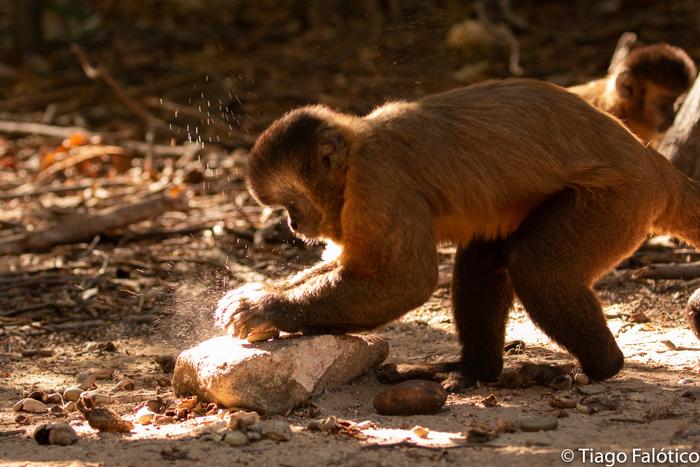In a world increasingly shaped by human activities, the rapid deterioration of our natural environment poses a significant challenge to biodiversity. Research conducted by scientists from the University of Victoria and the prestigious Max Planck Institute for Evolutionary Anthropology reveals that this decline transcends mere numbers; it undermines our understanding of animal behavior, particularly in the realm of tool use. This critical insight emphasizes the need for urgent measures to address the loss of not only species but also the intricate web of cultural behaviors that accompany them.
Cultural behaviors in animals, which range from the melodic songs of whales to the clever tool-utilization techniques of primates, serve as a testament to the adaptability of life in the face of environmental changes. Ammie Kalan, a prominent researcher at the University of Victoria, emphasizes that these cultural practices provide invaluable insights into the evolution of behavior across species. As the diversity of animal populations continues to wane, the capacity to learn from these adaptations diminishes, presenting a challenge to researchers and conservationists alike.
The significance of cultural behaviors lies not only in their role in species survival but also in their potential to enrich our understanding of the evolutionary paths of both animals and humans. The ability to use tools, for instance, is a vital form of behavioral adaptation that leaves discernible physical evidence behind. When paired with observational studies, these material cultures allow scientists to interpret the archaeological records of extinct human species, where stone tools often represent the most tangible evidence of past behaviors.
Preserving the cultural behaviors of non-human primates and other endangered species is more critical than ever, according to Lydia Luncz of the Max Planck Institute. These beings, sharing a common evolutionary lineage with humans, offer a unique window into our origins and the social complexities that arise from shared histories. However, the looming threat of extinction necessitates that we not only protect these creatures but also safeguard their unique behavioral traditions, which are facing unprecedented challenges.
Advancements in digital technology, such as 3D scanning, present exciting possibilities for the future of cultural preservation. These technologies enable researchers to reproduce tangible artifacts tied to animal behavior, thus creating a digital repository for future exploration. Moreover, capturing and analyzing the sounds, songs, and calls of various species offers priceless resources. This multifaceted approach can facilitate further research into animal behavior and enhance conservation efforts, ensuring that the richness of animal cultures is recognized and preserved.
As we grapple with the extensive impact of human activities on the natural world, there exists a compelling argument for recognizing the interconnectedness between human cultures and the diverse array of animal behaviors. The acknowledgment of this shared heritage is not merely an academic endeavor; it is a vital part of advancing scientific research and education. Recognizing the intricate relationships that exist within our ecosystems underscores the necessity for comprehensive conservation strategies that prioritize the safeguarding of both species and their cultural legacies.
To foster an environment where these discussions can flourish, it is essential to engage in a broader dialogue about the implications of biodiversity loss and the need for immediate action. Researchers, conservationists, and policymakers must come together to develop and implement strategies aimed at the preservation of animal cultural behaviors and the ecosystems they inhabit. This collaborative effort can pave the way for effective solutions to combat the ongoing crisis of biodiversity depletion.
Raising awareness and understanding the importance of animal cultural behaviors can help in building a bridge between scientific research and the public. Educational initiatives should seek to inform citizens about the unique adaptations of other species and how these behaviors reflect their environmental interactions. Through this awareness, there is potential to cultivate a deeper appreciation for wildlife, inspiring individuals to advocate for effective conservation measures that benefit all inhabitants of our planet.
Public engagement plays a crucial role in conservation efforts, as it empowers communities to take ownership of their natural surroundings and support initiatives aimed at preserving biodiversity. By highlighting the fascinating cultural aspects of animals, such as their tool use or intricate vocalizations, we can inspire a sense of wonder and responsibility towards the natural world. Connecting individuals to these marvels can motivate them to be active participants in the fight against the current climate crisis.
Innovations in outreach strategies can provide new pathways for conservationists to communicate their projects effectively. Utilizing social media, community events, and interactive platforms can captivate audiences, drawing attention to the pressing need for conservation and empowering individuals to take informed actions. By collaborating with artists and storytellers, we can illustrate the narratives surrounding animal cultural behaviors in compelling ways that resonate with diverse audiences.
In summary, facing the reality of biodiversity loss requires a multifaceted approach that emphasizes the need to preserve not only the species themselves but also the rich cultural behaviors that characterize them. Recognizing the value of these animal cultures can serve as a foundation for effective conservation strategies that integrate scientific insights with public engagement. As we confront the consequences of our actions on the environment, understanding the intricate interplay between cultural behaviors and species survival becomes pivotal for shaping a sustainable future for all.
With the interplay of technology, education, and community engagement, a path emerges that leads us towards a more profound appreciation for the diverse animal cultures sharing our planet. In doing so, we not only secure the survival of these species but also enrich our understanding of our place within the broader tapestry of life.
Subject of Research: Cultural behaviors in animals and their implications for conservation
Article Title: Saving the cultural legacy of wild animals
News Publication Date: 4-Apr-2025
Web References: http://dx.doi.org/10.1126/science.adj3716
References: N/A
Image Credits: © Tiago Falotico
Keywords: biodiversity, cultural behaviors, conservation, animal tool use, digital technology, species extinction, environmental change, cultural legacy, public engagement, awareness, animal cultures.




